
Giorgio La Pira (1904–1977)
Giorgio La Pira (January 4, 1904- November 5, 1977) was an Italian politician who served as mayor of Florence twice (1950-1956, 1960-1964). He also served as deputy of the Christian Democratic Party and participated in the assembly that wrote the Constitution of Italy after World War II. In his public and private life, La Pira was a tireless champion of peace and human rights who worked for the betterment of the poor and disenfranchised. The son of a Sicilian packing-house worker, La Pira was bo...
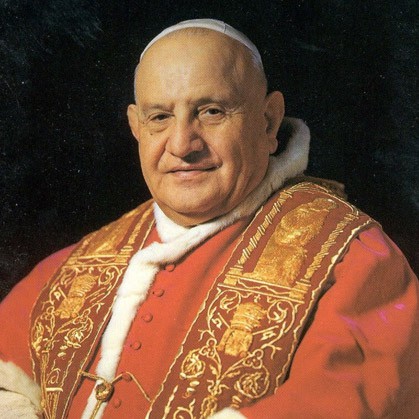
Pope John XXIII (1881–1963)
Pope (1958–63), born in Sotto il Monte, N Italy. He was ordained in 1904, served as a chaplain in World War 1, and was subsequently apostolic delegate to Bulgaria, Turkey, and Greece. Patriarch of Venice in 1953, he was elected pope in 1958 on the 12th ballot. He convened the Second Vatican Council (1962–5) to renew the religious life of the Church and to modernize its teachings, disciplines, and organization, with the aim of eventual unity of all Christians. His beatification was announced ...

Albert John Luthuli (1898–1967)
Albert John Mvumbi (Zulu: “Continuous Rain”) Luthuli was born in Rhodesia, where his father, John Bunyan Luthuli, a missionary interpreter, had gone from Zululand. After his father’s death, the 10-year-old Albert returned to South Africa and learned Zulu traditions and duties in the household of his uncle, the chief of Groutville, a community associated with an American Congregational mission in Natal’s sugar lands. Educated through his mother’s earnings as a washerwoman an...

Alfred Nobel (1801–1872)
Nobel was the third son of Immanuel Nobel (1801-1872) and Andriette Ahlsell Nobel (1805-1889). Born in Stockholm on October 21, 1833, he went with his family in 1842 to St. Petersburg, where his father (who had invented modern plywood) started a “torpedo” works. Alfred studied chemistry with Professor Nikolay Nikolaevich Zinin. In 1859, the factory was left to the care of the second son, Ludvig Nobel (1831-1888), who greatly enlarged it. Alfred, returning to Sweden with his father af...

Martin Luther, Jr King (1929–1968)
Martin Luther King, Jr. was an African-American clergyman who advocated social change through non-violent means. A powerful speaker and a man of great spiritual strength, he shaped the American civil rights movement of the 1950s and 1960s. King was pastor of the Dexter Avenue Baptist Church in Montgomery, Alabama from 1954-59. There he led blacks in the Montgomery bus boycott of 1955-56, an action inspired by the arrest of Rosa Parks when she refused to give up her seat on a public bus. Racial s...

Oscar (Arnulfo) Romero (y Galdames) (1917–1980)
Roman Catholic clergyman, born in Ciudad Barrios, E El Salvador. He studied theology at the Gregorian University in Rome, was ordained in 1942, and became bishop in 1970 and archbishop in 1977. An outspoken critic of the government, he was shot down while celebrating Mass a year after he was nominated for the Nobel Peace Prize. Some of his ‘Thoughts’ appeared in translation as The Church Is All of You (1984). A film, Romero, based on his life appeared in 1989. In March 2005, 25 years afte...
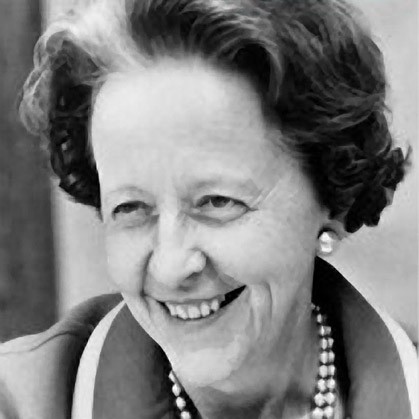
Dame Barbara (Mary), Baroness Jackson of Lodsworth Ward (1914–1981)
Barbara Ward was born in Heworth, Yorkshire on 23 May 1914, but her family soon moved to Felixstowe. Her father was a solicitor with Quaker tendencies, while her mother was a devout Catholic. Their daughter went to a convent school before studying in Paris: first at a lycée, then for some months at the Sorbonne before going on to Germany. Though she had once planned to study modern languages, her interest in public affairs led to a degree course in politics, philosophy, and economics at Somervi...
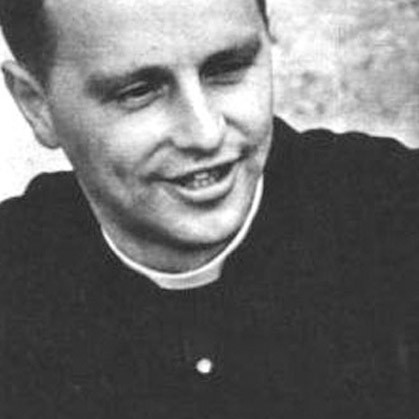
Don Lorenzo Milani Comparetti (1923-1967)
Lorenzo Milani Comparetti was the second son of Albano Milani and Alice Weiss. Lorenzo was a friendly and good-natured child. In his youth he was not a good student, but between 1941 and the 1943 he studied painting in Milan. In the summer of 1942, during a holiday in Gigliola (Montespertoli), Lorenzo re-decorated a chapel; he came across an old book in the chapel, took great interest in it, and started to study Christianity. Lorenzo was born in a family which gave little importance to religion;...
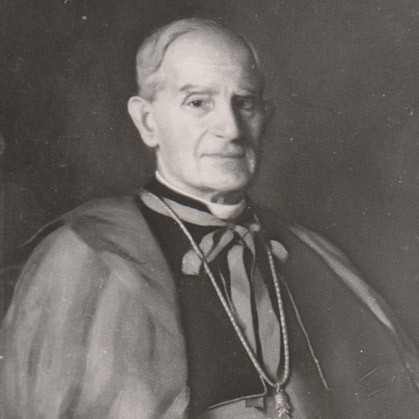
Dun Karm (1871–1961)
Dun Karm Psaila born in Żebbuġ, (18 October 1871 — 13 October 1961) was a Maltese writer and poet, sometimes called ‘the bard of Malta’ [1] Dun Karm, painted by Caruana Dingli. He was educated at the Seminary between the years 1885 and 1894 and then proceeded to study philosophy in 1888 and theology in 1890 the University of Malta. He was ordained priest in 1894. From 1895 to 1921 he taught various subjects at the Seminary: Italian, Latin, English, arithmetic, geography, cosmogra...
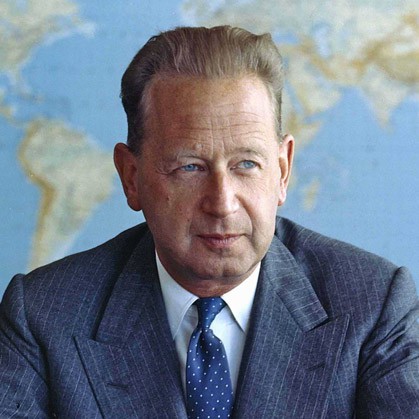
Dag Hammarskjold (1905–1961)
Dag Hammarskjöld was born in Jönköping, although he lived most of his childhood in Uppsala. He was the fourth and youngest son of Hjalmar Hammarskjöld, Prime Minister of Sweden (1914–1917), and Agnes Almquist. His ancestors had served the Swedish Crown since the 17th century. He studied at Uppsala University where he graduated with a Master’s degree in political economy and a Bachelor of Law degree. He then moved to Stockholm. From 1930 to 1934, he was a secretary of a governmental c...

Mother Teresa (1910–1997)
Mother Teresa was born Agnes Gonxha Bojaxhiu in Skopje*, Macedonia, on August 26, 1910. Her family was of Albanian descent. At the age of twelve, she felt strongly the call of God. She knew she had to be a missionary to spread the love of Christ. At the age of eighteen she left her parental home in Skopje and joined the Sisters of Loreto, an Irish community of nuns with missions in India. After a few months’ training in Dublin she was sent to India, where on May 24, 1931, she took her init...

Henry Dunant (1828–1910)
Born in Geneva on 8 May 1828, came from a devout and charitable Calvinist family. After incomplete secondary schooling, he was apprenticed to a Geneva bank. In 1853, he travelled to Algeria to take charge of the Swiss colony of Sétif. He started construction of a wheat mill, but could not obtain the land concession that was essential for its operation. After travelling to Tunisia he returned to Geneva, where he decided to approach Napoleon III to obtain the business document he needed. At the t...
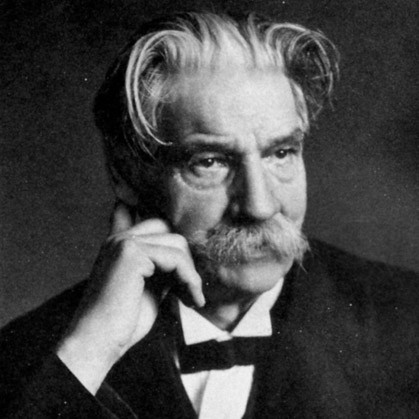
Albert Schweitzer (1875–1965)
Born into an Alsatian family which for generations had been devoted to religion, music, and education. His father and maternal grandfather were ministers; both of his grandfathers were talented organists; many of his relatives were persons of scholarly attainments. Schweitzer entered into his intensive theological studies in 1893 at the University of Strasbourg where he obtained a doctorate in philosophy in 1899, with a dissertation on the religious philosophy of Kant, and received his licentiat...

Albert Einstein (1879–1955)
Albert Einstein is one of the most notable and influential scientists of the twentieth century. Although he became known as a genius of science and gained considerable fame later in life, as a child he was slow in learning to speak, and had a rebellious nature towards the conventional styles of learning at school, which left many teachers to believe he would amount to little. Inspired by a compass, his “sacred little geometry book”, and classical music, his interest in science and ma...

Saint Francis of Assisi (1182–1226)
Francis Bernadone was born in Assisi in 1182 to Pietro and Picca Bernadone. Pietro was a cloth merchant and probably the richest man in Assisi. He anticipated even more wealth as the young Francis had demonstrated keen business skills. Francis, however, was unlike his greedy father. Rich in natural virtue, he was always quick to share his good fortune with his friends and even with the poor. Known as the king of youth, for his joyful nature and popularity, his primary aspiration was to be a knig...

Mahatma (Mohandas Karamchand) Gandhi (1869–1948)
Indian nationalist leader. Born Mohandas Karamchand Gandhi on October 2, 1869 in Poorbandar, Kathiawar, West India. He studied law in London, but in 1893 went to South Africa, where he spent 20 years opposing discriminatory legislation against Indians. As a pioneer of Satyagraha, or resistance through mass non-violent civil disobedience, he became one of the major political and spiritual leaders of his time. Satyagraha remains one of the most potent philosophies in freedom struggles throughout t...
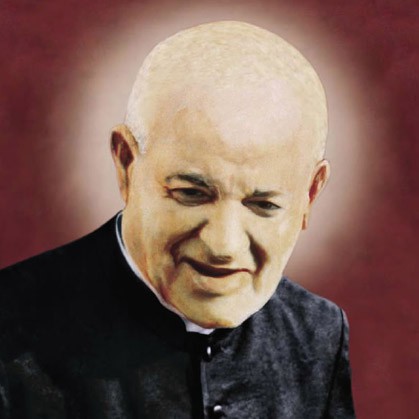
San Gorg Preca (1880–1962)
Ġorġ Preca was born in Valletta, Malta, on 12 February 1880. He was the seventh of nine children. Early in his childhood, his family moved to Ħamrun, where he started serving Mass as an altar boy. Preca studied at the Lyceum, considered the pre-eminent secondary school in the island. Preca then entered seminary, where he excelled, especially in Latin. He was eventually ordained a deacon. However, he was subsequently diagnosed as suffering from lung failure. The prognosis was not good, and he ...

Folke Bernadotte (1895–1948)
Folke Bernadotte was born in Stockholm, Sweden, on January 2, 1895. A descendent of the Napoleonic marshal Jean Bernadotte, who in 1810 was elected crown prince of Sweden, and in 1818 succeeded to the throne as Charles XIV, Count Bernadotte was also a grandson of King Oscar II of Sweden and a nephew of King Gustav V. After graduating from the military school of Karlberg, he studied horsemanship at the Stromsholm military riding school and became cavalry office in the Royal Horse Guards. On Decem...

